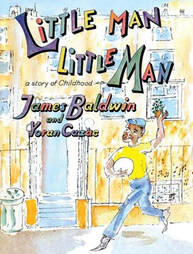Maite UrcareguiDoctoral candidate of English at the University of California, Santa Barbara.  James Baldwin and Yoran Cazac’s Little Man, Little Man: A Story of Childhood is Baldwin’s love letter to Harlem and to his nephew, Tejan, for whom the story was written. The illustrated children’s book, which was marketed as “a child’s story for adults” on its original jacket cover (1976), follows a day in the life of four-year-old TJ as he moves throughout his Harlem neighborhood with his friends WT and Blinky. While the story could be categorized as an illustrated book, I purposefully place it within a capacious definition of graphic narrative and, thus, in the purview of comics studies. The story places images in intricate spatial relationships, at times creating panel-like structures, that exceed the illustrative and become integral to how the text creates meaning. Through its visual form, Baldwin and Cazac’s graphic narrative make visible how political geographies of race, particularly architectures of surveillance and policing, contour TJ’s experience with space. |
AboutDue to the ongoing pandemic crisis, ICAF was forced to cancel its events at the 2020 Small Press Expo. Over the next 16 weeks (give or take), we will be publishing Archives
February 2021
Categories
All
|
 RSS Feed
RSS Feed